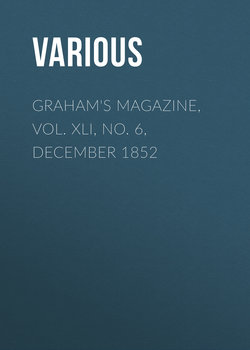Graham's Magazine, Vol. XLI, No. 6, December 1852

Реклама. ООО «ЛитРес», ИНН: 7719571260.
Оглавление
Various. Graham's Magazine, Vol. XLI, No. 6, December 1852
“PALE CONCLUDING WINTER.”
A HISTORY OF THE ART OF WOOD-ENGRAVING
RIVERS
WERE I BUT WITH THEE
SONNET. – IRON
NINEVEH, AND ASSYRIAN ART
FRAGMENT OF A POEM
MONDE HEDELQUIVER
CHAPTER I
CHAPTER II
CHAPTER III
CHAPTER IV
CHAPTER V
CHAPTER VI
WELLINGTON
SONNET. – HOMER
GRACE BARTLETT
CHAPTER I
CHAPTER II
CHAPTER III
CHAPTER IV
CHAPTER V
CHAPTER VI
CHAPTER VII
CHAPTER VIII
CHAPTER IX
CHAPTER X
CHAPTER XI
SONNET
UPS AND DOWNS
CHAPTER I
CHAPTER II
CHAPTER III
CHAPTER IV
CHAPTER V
FATHER BROMLEY’S TALE
HOURS IN AUGUST
ANNIE
THE USEFUL ARTS IN OTHER NATIONS AND TIMES
BLIND SIGHT-SEEING
THE LUCKY PENNY
CHAPTER IV
THE TOPMOST CITY OF THE EARTH
BETTER DAYS
REVIEW OF NEW BOOKS
Отрывок из книги
With regard to the antiquity and origin of this most beautiful and most important of the early Christian arts – most important, because to it can be traced directly the invention of typography, as it now exists, bringing knowledge and truth within the reach of all who desire to attain them – there has been much difference and dispute among the literati. After the second restoration of letters – I mean after the dull and dreary interregnum between the era of the Stuarts and the Georgian era of literature, dating from the commencement of the present century – there seems to have arisen a strange habit of referring every thing, the origin of which was not distinctly known, to eras the most remote. Not to be able to say such a discovery was made by such a learned German or Venetian, by such a celebrated Gaul or Briton, in such a town, in such a year, of such a century, was sufficient cause for the drivelers of the time – the best scholars of whom knew, like Shakspeare, little Latin and less Greek, assuming, nevertheless, the possession of the deepest classic lore – to assert point-blank that it was made by such a wonderful Chinese philosopher during the reign of Wu-wang, emperor of China, or such a remarkable Egyptian sage, in the reign of Tathrak or Amenophis; or, that it was in common use in the days of Pericles, or perhaps even of the later Roman emperors.
The general knowledge of the classic languages was then so rare even among the authors of those days, that the dictum of any dunce who grossly misconstrued a Greek or Latin text, or of any rogue, who chose to forge one in support of his theory – in those days a matter of daily occurrence – was, so far from being questioned, detected, refuted, and exposed, as would now be the case, within a week of its publication, quoted and requoted by successive schools of dunces, until it was received as a truth, and sent down as a grave authority to future generations.
.....
To produce greater depth of shadow in one part of a metallic engraving than in others, the lines must be cut deepest where the shadow is to be the blackest, and thence graduated, less and less deep, to the plain surface, which gives pure white.
To produce greater depth of shadows in one part of a wood-cut than in others, the prominent lines must be left most prominent where the shadow is to be the blackest; and thence shaved away more and more, as the shadows are to be less intense, until no lines at all are left on which the paper can impinge, and there will be pure white.
.....